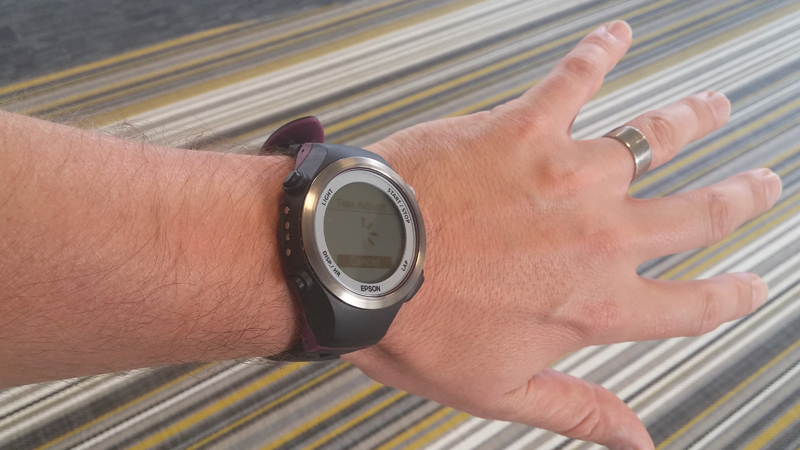Epson Runsense SF-810 review: what it is, why it matters
The Epson Runsense SF-810 is a watch that, as the name may suggest, is built for runners. It includes GPS and a heart rate monitor. The built-in optical heart rate sensor is partnered with Epson’s Smart Stride measurement, and the GPS sensors, so you can accurately measure how far you have run, and how quickly (or slowly). Advanced training modes are included to help the elite athlete get more from their tired limbs.
Epson Runsense SF-810 review: price and value
In terms of value this is actually okay. The broadly similar TomTom Multi-Sport Cardio sport watch retails for £200, although you can pick it up cheaper if you shop around. Which is okay: this is a fitness gadget, and not a smartphone extension like a smartwatch. The Microsoft Band retails for around £145, for instance, and offers some smartwatch features such as email notifications. But it isn’t waterproof, and can’t be used for swimming or in the shower as can the Epson. You will pay the same of more for the Fitbit Surge, which is the equivalent FitBit fitness device. So the Epson is well priced, but only for fitness enthusiasts who don’t want additional connected features. See all smartwatch reviews.
Epson Runsense SF-810 review: build quality and design
The Epson Runsense SF-810 wins points for actually looking like a watch, but then loses them for looking like the sort of watch you might win at a fair. It’s not a fashion accessory, of course, but if I am dropping two hundred notes on a wearable device, these days I expect something more than black and gray plastic and rubber. Which is not say that the Epson Runsense SF-810 is at all ugly. Indeed, it has a certain understated charm. A circular watch fascia is surrounded by a smart silvery ring. Big chunky buttons adorn the outside, and are easy to hit even when sweating and running. And the now familiar holey strap allows for almost limitless adaptability in terms of wrist size. Waterproof, we tried the Epson Runsense SF-810 in both shower and pool with no adverse effects. And it is sufficiently robust to stand up to over a month in our running bag, being dragged around, without picking up scratches. We did get a bit of grime on the inside of the watch face, however. Nothing that a quick shower won’t sort out. The provided charging cable is easy to use, well put together, and versatile – in that it charges from USB. Weighing only 50g, the Epson Runsense SF-810 is unlikely to slow you down, either. It is 44.5 mm wide and 14 mm thick at the outsides, so it is relatively slight, for a GPS watch. Overall we have no real problems with the Epson Runsense SF-810’s design, and its build quality is good. Also see: Best activity trackers
Epson Runsense SF-810 review: display
We measured the Runsense’s display at 28.2 mm across. It is a circular LCD display, with a resolution of 128 x 128 pixels. Don’t expect to have your socks knocked off. It’s neither particularly bright, nor particularly sharp, but you can see the required information comfortably when on the move. And there is a light for night time runs. The Epson Runsense SF-810’s display is perfectly acceptable, without being great. You can read it, and it tells you what you need to know. And that is good enough for me.
Epson Runsense SF-810 review: in use
Let’s go for the good points first. We found that the Epson Runsense SF-810 offered a pretty accurate and consistent heart-rate read. And used over a period of time it showed consistent and accurate GPS tracking on runs. That easy-to-read display offers up a lot of data, and the bezel buttons are easy to use and intuitive. And, yes, we like that it can be worn in the shower. I have lost a few gadgets that way. Those are pretty important, and so far so good. What is great is the long battery life. We used the Epson Runsense SF-810 several times for decent-length runs over the course of a fortnight, and it never needed recharging. Epson claims up to 20 hours in use with GPS on, and we wouldn’t argue with that. See all wearable tech reviews. And the bad? Our biggest gripe is that in our tests GPS signal acquisition was a little slow, and quite hit and miss. Anyone who has used a satnav knows that this is a standard thing, but the Epson Runsense SF-810 was more painful to use in this respect than either the TomTom Multi-Sport of the Microsoft Band. Potentially unfair because it is what it is (but also true) this is a limited device, really only for serious runners. There is no all-day activity tracking, so don’t expect this to replace your FitBit. And there are no non-running modes. It really is about measuring heartrate and on-foot distance only. Workout data isn’t synced to your smartphone unless you tell it to, either, and the mobile app is slow and buggy. Matt Egan is Global Editorial Director of IDG, publisher of Tech Advisor, and a passionate technology fan who writes on subjects as diverse as smartphones, internet security, social media and Windows.

